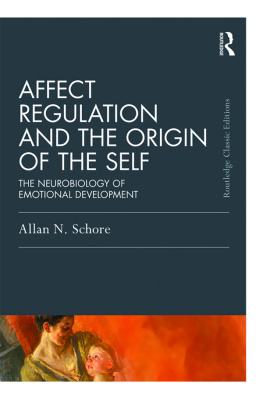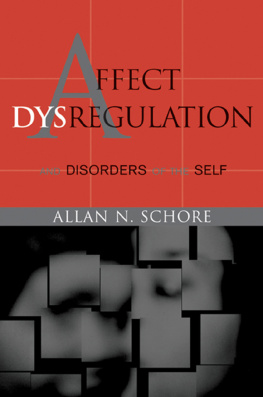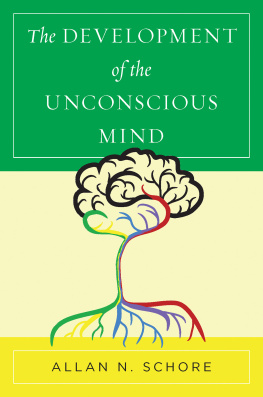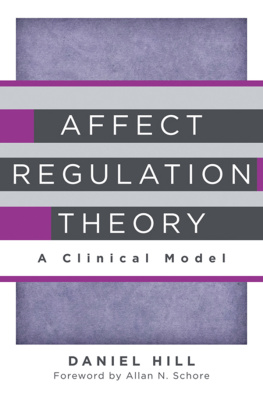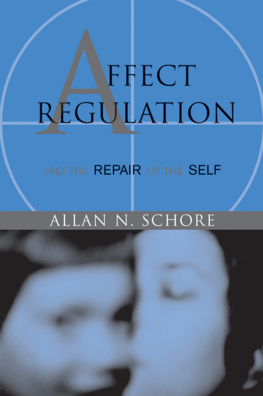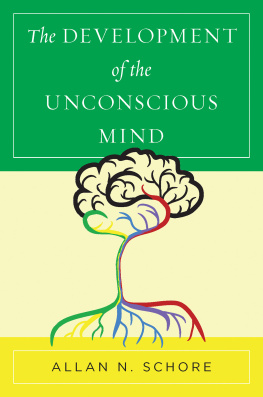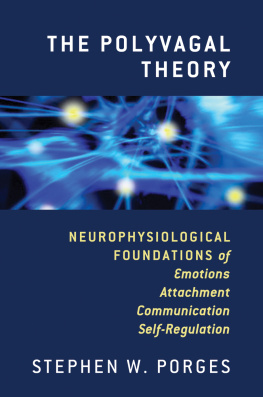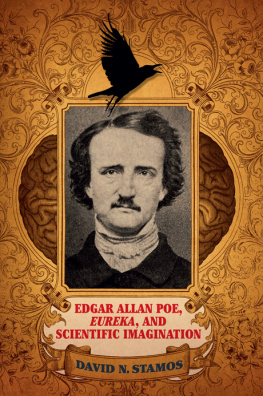Classic Edition published 2016
by Routledge
711 Third Avenue, New York, NY 10017
and by Routledge
2 Park Square, Milton Park, Abingdon, Oxon OX14 4RN
Routledge is an imprint of the Taylor & Francis Group, an informa business
2016 Taylor & Francis
The right of Allan N. Schore to be identified as author of this work has been asserted by him in accordance with sections 77 and 78 of the Copyright, Designs and Patents Act 1988.
All rights reserved. No part of this book may be reprinted or reproduced or utilised in any form or by any electronic, mechanical, or other means, now known or hereafter invented, including photocopying and recording, or in any information storage or retrieval system, without permission in writing from the publishers.
Trademark notice: Product or corporate names may be trademarks or registered trademarks, and are used only for identification and explanation without intent to infringe.
First edition published by Lawrence Erlbaum Associates 1994
Library of Congress Cataloging-in-Publication Data
Names: Schore, Allan N., 1943 author.
Title: Affect regulation and the origin of the self : the neurobiology of
emotional development / Allan N. Schore.
Description: New York, NY : Psychology Press, 2016. | Includes
bibliographical references and index.
Identifiers: LCCN 2015037844 | ISBN 9781138917064 (hbk : alk. paper) |
ISBN 9781138917071 (pbk : alk. paper) | ISBN 9781315680019 (ebk)
Subjects: LCSH: Emotions in infantsPhysiological aspects. | Self in
infantsPhysiological aspects. | SocializationPhysiological aspects. |
Developmental neurobiology. | Mother and infant.
Classification: LCC BF720.E45 S36 2016 | DDC 155.42/224dc23
LC record available at http://lccn.loc.gov/2015037844
ISBN: 978-1-138-91706-4 (hbk)
ISBN: 978-1-138-91707-1 (pbk)
ISBN: 978-1-315-68001-9 (ebk)
Typeset in Bembo
by Apex CoVantage, LLC
Contents
James S. Grotstein
PART II Early Infancy
Orbitofrontal Control of Corticotropin Releasing Factor as a Mechanism of Regulation of Sympathetic and Parasympathetic Activities
Summary
Stabilization or Elimination of Permanent Orbitofrontal-Limbic Connections
25 Orbitofrontal Influences on the Autonomic Nervous System
Summary
Inhibition, Delay, and Self-Regulation
Over the past two decades, a diverse group of disciplines have suddenly and simultaneously intensified their attention on the scientific study of internal processes. The nature of the covert mechanisms that underlie overt behaviors were, for much of this century, deemed to be outside the domain of prevailing psychological models and existing research methodologies. The remarkable productivity of investigations of various cognitive operations has demonstrated the accessibility of internal processes to both qualitative and quantitative analyses, and has legitimized a shift from the formal study of the exterior and observable to the interior and hidden, yet substantive, aspects of human functioning. Even more recently, a sudden surge of multidisciplinary activity, at quite different levels of analysis, has initiated a deeper exploration into another class of internal processes, that of emotional states.
This acceleration of research into affective phenomena has been paralleled by an explosion in the number of studies of early human structural and functional development. Developmental neuroscience is now delving not only into early cognitive and memorial processes, but also into the ontogeny of hierarchically organized brain systems that evolve to support the psychobiological underpinnings of socioemotional functioning. Studies of the infant brain demonstrate that its development occurs in stages over critical periods, and that its maturation is influenced by the environment and is experience dependent. Concurrent developmental psychological research dramatically emphasizes that the infants emerging socioaffective functions are fundamentally influenced by the dyadic transactions the child has with the primary caregiver. In these fast acting, hidden communications, the mother senses and modulates the nonverbal and affective expressions of her infants psychobiological states. In other words, the experiences that fine-tune brain circuitries in critical periods of infancy are embedded in socioemotional interchanges between an adult brain and a developing brain. In line with these findings, developmental studies are revitalizing contemporary psychoanalysis. This observational data strongly suggests that the mothers regulatory functions not only modulate the infants internal state, but also indelibly and permanently shape the emerging selfs capacity for self-organization. Studies of incipient relational processes and their effects on developing structure are thus an excellent paradigm for the deeper apprehension of the organization and dynamics of affective and affect-regulatory phenomena.
The purpose of this book is to integrate two rapidly converging streams of developmental research: psychological studies of the critical interactive experiences that influence the development of socioemotional functions and neurobio-logical studies of the ontogeny of postnatally maturing brain structures that come to regulate these same functions. A triad of fundamental assumptions underlies this work on the neurobiology of emotional developmentthat the compelling questions of human emotion and motivation can only be understood in terms of structurefunction relationships, that the primordial conditions in which these evolve occur in the context of the caregiverinfant interaction, and that an understanding of the principles of human developmental psychobiology is a prerequisite and powerful impetus to the elucidation of the dynamic mechanisms of all later socioemotional phenomena.
This volume addresses the fundamental problems of how and why early events permanently affect the development of the self. Drawing upon current findings in infant research and neurobiology, a central hypothesis is proposedthat the infants affective interactions with the early human social environment directly and indelibly influence the postnatal maturation of brain structures that will regulate all future socioemotional functioning. This principle of the experience-dependent development of self-regulatory structures and functions is supported by multidisciplinary evidence from a spectrum of developmental sciences. Furthermore, the structural characteristics and the dynamic functional properties of such a system are identified to be mediated by the orbitofrontal cortex, the major cerebral system involved in social, emotional, motivational, and self-regulatory processes. This cerebral structure is hidden in the anterior undersurface and interior of the cortex, and is especially developed in the right hemisphere. Due to its unique and extensive interconnections with a number of subcortical systems, it represents the hierarchical apex of the limbic system. A critical period for the maturation of this prefrontal structure exactly overlaps the temporal interval extensively investigated by both attachment and psychoanalytic researchers. An understanding of the caregiver-influenced development of this corticolimbic structure elucidates the unique role of the early maturing right hemisphere in affective processes and in the regulation of internal states.
More than just a review of several literatures, the studies cited in this work are used as a multidisciplinary source pool of experimental data, theoretical concepts, and clinical observations that form the base and scaffolding of an over-arching heuristic model of socioemotional development that is grounded in contemporary neuroscience. This psychoneurobiological model is then used to generate a number of heuristic hypotheses regarding the proximal causes of a wide array of affect-related phenomena. The keystone of this model is the principle of the development of self-regulation. An emergent property of hierarchically organized corticalsubcortical systems is the capacity to regulate the transitions between various internal states that support affect, cognition, and behavior. A current common focus on the adaptive regulatory processes of living systems, from the molecular up through the social levels, highlights the unique explanatory power of this central linking concept to organize what on the surface appear to be disparate bodies of knowledge and to reveal many of the hidden mechanisms of development. My intention in writing this volume is to demonstrate that a deeper understanding of affect regulation and dysregulation can offer penetrating insights into a number of affect-driven phenomenafrom the motive force that underlies human attachment to the proximal causes of psychiatric disturbances and psychosomatic disorders, and indeed to the origin of the self.

